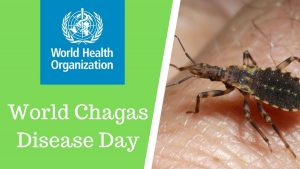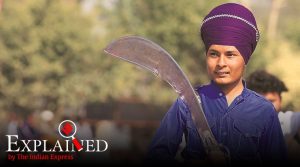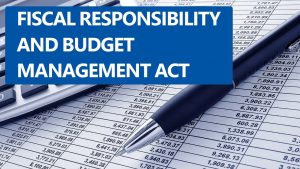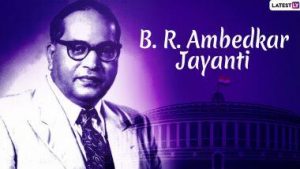Table of Contents
Daily Current Affairs for Government Exams:
Today Current Affairs:14th April 2020 for UPSC IAS exams, State PSC exams, SSC CGL, State SSC, RRB, Railways, Banking Exam & IBPS, etc
Contents:
- Floor Test is Governor’s Discretion.
- World Chagas Disease Day.
- Nihangs
- Fiscal Responsibility and Budget Management (FRBM) Act
- Sovereign Gold Bonds
- Retail Inflation Dropped:
- Index funds
- Dr. B R Ambedkar’s Birth Anniversary
- India tightened its curbs on imports of palm oil
- Other important current affairs
1. Floor Test is Governor’s Discretion:
Recently, the Supreme Court of India has held that a Governor can call for a floor test any time he/she objectively feels a government in power has lost the confidence of the House and is on shaky ground.
- S.C. held that a Governor can call for a trust vote (confidence motion) if he/she has arrived at a prima facie opinion, based on objective material, that the incumbent State government has lost its majority in the Assembly.
- However, while directing a trust vote, the Governor should not favor a particular political party.
- Timing of a trust vote may tilt the balance towards the party possessing a majority at the time the trust vote is directed.
- Governor’s power to call for a floor test is not restricted only before the inception of a State government immediately after elections but continues throughout its term.
The SC has clarified that the Governor’s power of trust vote does not hamper any disqualification proceedings pending before the Speaker. - A Governor need not wait for the Speaker’s decision on the resignation of rebel Members of Legislative Assembly (MLAs) before calling for a trust vote.
2.World Chagas Disease Day:

On April 14, 2020, World Chagas Disease Day is being observed for the first time.
- The day is observed to spread awareness about this “silent and silenced disease”. The 72nd World Health Assembly approved the designation of Chagas Disease Day on May 24, 2019.
The Chagas disease is called silent because it progresses slowly, and silenced because it mainly affects the poor people who often lack political voice and proper health care.
- The disease got its name from Dr. Carlos Ribeiro Justiniano Chagas, who diagnosed the first patient with the disease in Brazil on April 14, 1909.
- It is classified as a neglected tropical disease (NTD), meaning it affects the low-income populations in developing countries across the globe.
- Also called the American trypanosomiasis, this vector-borne disease hits the most poverty-stricken communities, especially in Latin America.
- A parasitic protozoan called Trypanosoma cruzi that causes this vector-borne disease is usually transmitted by feces and urine of triatomine bugs or kissing bugs, which belongs to the family of assassin bugs.
- The disease can also be transmitted by contaminated food, organ transplantations, blood or blood products transfusion, and infected mothers to newborn.
3.Nihangs:

The Patiala incident in which a group of Nihangs attacked a Punjab police party and chopped off the hand of an assistant sub-inspector when stopped for a curfew pass has put the spotlight on the Nihangs.
- Nihang is an order of Sikh warriors, characterized by blue robes, antiquated arms such as swords and spears, and decorated turbans surmounted by steel quoits.
- Nihangs use the slogans ‘chhardi Kala’ (forever in high spirits) and ‘tiar bar tiar’ (state of ever preparedness) for unforeseen events.
- Any person irrespective of caste, creed or religion can be included provided he has unshorn hair as per the Sikh traditions at the time of entering the sect.
- Their origin can be traced back to the creation of the Khalsa by Guru Gobind Singh in 1699. The word Nihang also occurs in a hymn in the Guru Granth Sahib, where it alludes to a fearless and unrestrained person.
- Nihangs had a major role in defending the Sikh Panth after the fall of the first Sikh rule (1710-15) when Mughal governors were killing Sikhs and during the onslaught of Afghan invader Ahmed Shah Durrani (1748-65).
- Nihangs also took control of the religious affairs of the Sikhs at Akal Bunga (now known as Akal Takht) in Amritsar.
4. Fiscal Responsibility and Budget Management (FRBM) Act.:

In a meeting with PM Modi, the majority of the Chief Ministers flagged the issue of a crippling shortage of funds and demanded to increase the State’s access to revenue under the Fiscal Responsibility and Budget Management (FRBM) Act.
- The FRBM Act, enacted in 2003 by Parliament aims to reduce India’s fiscal deficit and improve macroeconomic management.
- The rules for implementing the Act were notified in July 2004 and since then every Budget of the Union government has included a Medium-Term Fiscal Policy Statement that specifies the annual revenue and fiscal deficit goals over a three-year horizon.
- Under it, the present target is of reducing the fiscal deficit to 3.1% of GDP by March 2023.
- To ensure that the States to are financially prudent, the 12th Finance Commission’s recommendations in 2004 linked debt relief to States with their enactment of similar laws.
- The States have since enacted their own respective Financial Responsibility Legislation, which sets the same 3% of Gross State Domestic Product (GSDP) cap on their annual budget deficits.
Relaxation under FRBM:
- The law does contain what is commonly referred to as an ‘escape clause’.
- Under Section 4(2) of the Act, the Centre can exceed the annual fiscal deficit target citing grounds that include national security, national calamity, and decline in real output growth of a quarter by at least three percentage points below the average of the previous four quarters.
- Given that the ongoing pandemic could be considered as a national calamity the current circumstances would be apt for suspending both the Centre’s and States’ fiscal deficit targets.
- This would allow both the Union government and States to undertake the much-needed increases in expenditure to meet the extraordinary circumstances.
5.Sovereign Gold Bonds:

The government of India, in consultation with the Reserve Bank of India, has decided to issue Sovereign Gold Bonds.
- The sovereign gold bond was introduced by the Government in 2015.
- The government introduced these bonds to help reduce India’s over-dependence on gold imports.
- The move was also aimed at changing the habits of Indians from saving in the physical form of gold to a paper form with Sovereign backing.
- Eligibility: The bonds will be restricted for sale to resident Indian entities, including individuals, HUFs, trusts, universities and charitable institutions.
- Denomination and tenor: The bonds will be denominated in multiples of gram(s) of gold with a basic unit of 1 gram. The tenor will be for 8 years with an exit option from the 5th year to be exercised on the interest payment dates.
- Minimum and Maximum limit: The minimum permissible investment limit will be 1 gram of gold, while the maximum limit will be 4 kg for individual, 4 Kg for HUF and 20 kg for trusts and similar entities per fiscal (April-March) notified by the government from time to time.
- Joint Holder: In case of joint holding, the investment limit of 4 kg will be applied to the first applicant only.
- Collateral: Bonds can be used as collateral for loans. The loan-to-value (LTV) ratio is to be set equal to ordinary gold loan mandated by the Reserve Bank from time to time.
6. Retail Inflation Dropped:

According to the Consumer Price Index (CPI) data released by the National Statistical Office (NSO), the retail inflation in March 2020 dropped to 5.91% due to a decrease in demand and lowered food prices.
- Retail inflation (or CPI-based inflation) decreased to 5.91% in March 2020 from 6.58% in February 2020.
- The retail inflation rate was based on 66% of the usual price quotations as the nationwide lockdown to counter the Covid-19 pandemic had led to the suspension of fieldwork for price collection after March 19, 2020.
- The inflation rate in March 2020 remained within the Reserve Bank of India’s (RBI’s) medium-term target of 4±2% for Consumer Price Index (CPI) inflation.
- This was due to suppressed demand, especially for non-essential items, as the lockdown was imposed towards the end of March 2020.
- This inflation range (4% within a band of +/- 2%) was recommended by the committee headed by Urjit Patel in 2014.
- Fuel and Light segment: The inflation rose to 6.59% from 6.36% in February 2020.
- Food inflation moderated to 8.76% from 10.81% in March 2020.
- The food price inflation of various items like vegetables, spices, pulses continues to be in double digits.
- The pressure is expected due to the shortages witnessed in different centers with mandi arrivals being affected due to lockdown.
8.Index funds :
Index funds — which track performances of widely traded indices, such as the Nifty and the Sensex — saw a fourfold jump in inflows in March. Last month, such funds received inflows to the tune of Rs 2,076 crore, as against Rs 511 crore the previous month.
- Index funds, as the name suggests, are funds that replicate a certain index.
- So, if there is a Sensex fund, it will have the same 30 stocks that are there in the Sensex. Further, the weightage of each stock in the fund would also mirror their respective weightage in the actual index.
- Globally, many index funds replicate popular benchmarks like the S&P 500 and Dow Jones. In the Indian arena, most of the leading mutual fund houses offer index funds based on Sensex or Nifty.
- Index funds are a form of passive funds since the fund manager does not have to actively do any kind of stock picking. The fund sees a churn in its portfolio only if the actual index sees any inclusion or exclusion
- Typically, the benchmark index of any exchange would comprise the largest and most liquid companies publicly listed on that bourse. The benchmarks are quite diversified in terms of sector representation as well.
- So, investing in an index fund allows the investor to have a well-diversified portfolio of the largest companies.
- An investor can own a basket of stocks at a much lower cost compared to owning each stock individually in a benchmark.
9.Dr. B. R. Ambedkar’s 129th Birth Anniversary:

Dr. B R Ambedkar’s Birth Anniversary is observed every year on 14th April.
- Dr. B.R. Ambedkar was born in 1891 in Mhow, Central Province (now Madhya Pradesh).
- He is known as the Father of the Indian Constitution and was India’s first Law Minister.
- He was the Chairman of the Drafting Committee for the new Constitution.
- Dr. Ambedkar was a social reformer, jurist, economist, author, polyglot (knowing or using several languages) orator, a scholar and thinker of comparative religions.
- He led the Mahad Satyagraha in March 1927 against Hindus who were opposing the decision of the Municipal Board.
- In 1926, the Municipal Board of Mahad (Maharashtra) passed an order to throw open the tank to all communities. Earlier, the untouchables were not allowed to use water from the Mahad tank.
- He participated in all three Round Table Conferences.
- In 1932 Dr. Ambedkar signed the Poona pact with Mahatma Gandhi, which abandoned the idea of separate electorates for the depressed classes (Communal Award).
- In 1936, he was elected to the Bombay Legislative Assembly as a legislator (MLA).
- He was appointed to the Executive Council of Viceroy as a Labour member in 1942.
- In 1947, Dr. Ambedkar accepted PM Nehru’s invitation to become Minister of Law in the first Cabinet of independent India.
- He resigned from the cabinet in 1951, over differences on the Hindu Code Bill.
- He converted to Buddhism.
- He passed away on 6th December 1956.
- Chaitya Bhoomi is a memorial to B. R. Ambedkar, located in Mumbai.
10. India tightened its curbs on imports of palm oil:

India tightened its curbs on imports of palm oil. Under the new conditions, the authorization for imports of palm oil should be accompanied with the pre-purchase agreement.
- Apart from the pre-purchase agreement, “certificate of origin” has also been made mandatory. This certificate is important to prove where the goods come from. The import licensing of palm oil has been made to 6 months in place of 18 months.
- The rules of origin certificate are required for countries with which India has trade agreements. These curbs are being introduced to regulate shipments during lockdown.
- India is the world’s largest importer of vegetable oil and buys around 15 million tonnes annually.
- India primarily imports palm oil from Indonesia and Malaysia. Malaysia produces 19 million tonnes of palm oil a year and Indonesia produce 43 million tonnes of palm oil a year.
- The Palm oil had been put to the restricted category from Free since the remarks of Malaysian prime minister.
Other important current affairs:
1. The Brihanmumbai Municipal Corporation of Mumbai recently issued a circular that bodies of all COVID-19 patients would be cremated at the nearest crematorium, without any rituals.
- The circular was later amended, allowing burials only if grounds were large enough.
- The Union Health Ministry’s detailed guidelines for handling of bodies of COVID-19 patients allow both cremation and burial. It makes no mention of any risk of contamination from bodies if buried.
- Bodies of people infected with microbes such as HIV and SARS-CoV-2 come under Biosafety Levels II and III.
- Burial is considered as safe as the body is sealed. Coronavirus infection spreads by droplets. But there has been no case recorded where body fluids leaked from a body contaminated groundwater and spread infection.
- If the body is cremated, the ash does not pose any risk either.
2. The Supreme Court passed orders in a suo motu hearing on measures taken to decongest prisons, correction homes and detention centers due to the Covid-19 outbreak.
- Earlier, the Bench had ordered the States and the Union Territories to set up special committees to examine the cases of prisoners and shortlist those who could be granted bail or parole.
- The SC ordered not to release prisoners on interim bail or parole who test positive for Covid-19.
- The court ordered to release prisoners or detenus who have been under detention for two years in the foreigners’ detention centres in Assam on account of the Coronavirus pandemic.
3. SHG women working as Business Correspondents for banks (BC Sakhis) and Bank Sakhis playing a vital role in the disbursement of the first tranch of ex-gratia of Rs.500/- to women PMJDY accounts amidst COVID-19 Lockdown.
- Business Correspondents are retail agents engaged by banks for providing banking services at locations other than a bank branch/ATM.
- Banks are required to take full responsibility for the acts of omission and commission of the BCs that they engage and have, therefore, to ensure thorough due diligence and additional safeguards for minimizing the agency risk.
4. The President of India greeted people on the occasion of Vaisakhi, Vishu, Rongali Bihu, Naba Barsha, Vaisakhadi, Puthandu, Pirappu, which are being celebrated in different parts of the country on 13th and 14th April 2020.
- Baisakhi: Baisakhi, also known as Vaisakhi, Vaishakhi, or Vaisakhi, is celebrated with much fanfare in Punjab, Haryana, and Chandigarh. Baisakhi is a spring harvest festival for the Sikhs.
- Rongali Bihu: Assam celebrates Bihu thrice in a year but Rongali Bihu is the biggest and most popular.
- Poila Boishakh: Poila Boishakh also known as Pahela Baishakh or Bangla Nababarsha is the first day of Bengali Calendar.
- Mahabishuva Sankranti: On the same day, Odisha celebrates Mahabisuha Sankranti, better known as Pana Sankranti.
- Puthandu: Puthandu in Tamil Nadu marks the first day of the Tamil New Year.
- Vishu: Vishu in Kerala marks the completion of the spring equinox. But unlike Onam, the other harvest festival, Bikhoti: The Bikhoti Festival of Uttrakhand involves people taking a dip in holy rivers.
- Jurshital: In the Mithal region of Bihar and Nepal, the new year is celebrated as Jurshital.
6. The US State Department has approved the sale of missiles and torpedoes worth $155 million to India.
- The sale of 10 AGM-84L Harpoon Block II air-launched missiles is estimated to cost USD 92 million.
- The sale of 16 MK 54 All Up Round Lightweight Torpedoes and 3 MK 54 Exercise Torpedoes are estimated to cost $63 million.
- Indian Government has requested the US for this military hardware.
7. The Indian Army commemorated Siachen Day. The day is observed to commemorate the courage of the Indian Army under “Operation Meghdoot”. The Day also honors Siachen Warriors serving motherland successfully from the enemy.
- Every year, the Indian army commemorates by displaying the courage of Indian Army troops that are securing the coldest and highest battlefield in the world.
- The Operation Meghdoot was launched on April 13, 1984. Under the operation, the Indian troops successfully gained control of the entire Siachen glacier. The Operation was led by Lieutenant General Prem Nath Hoon.
8. The Indian Council of Medical Research announced that the antiviral drug Remdesvir is highly effective in stopping the replication of COVID-19.
- The research on the efficacy of Remdesvir is a part of WHO’s “Solidarity Trial”.
- The efficacy of Remdesvir is not based on clinical trials. However, ICMR is concluding its efficacy based on studies.
- According to studies, 68% of patients that were under the treatment of Remdesvir did not require a ventilator or oxygen support after taking the drug.
- Further development on the efficiency of the drug is to be learned from the mega trials of WHO.
- WHO has launched 4 mega trials.




